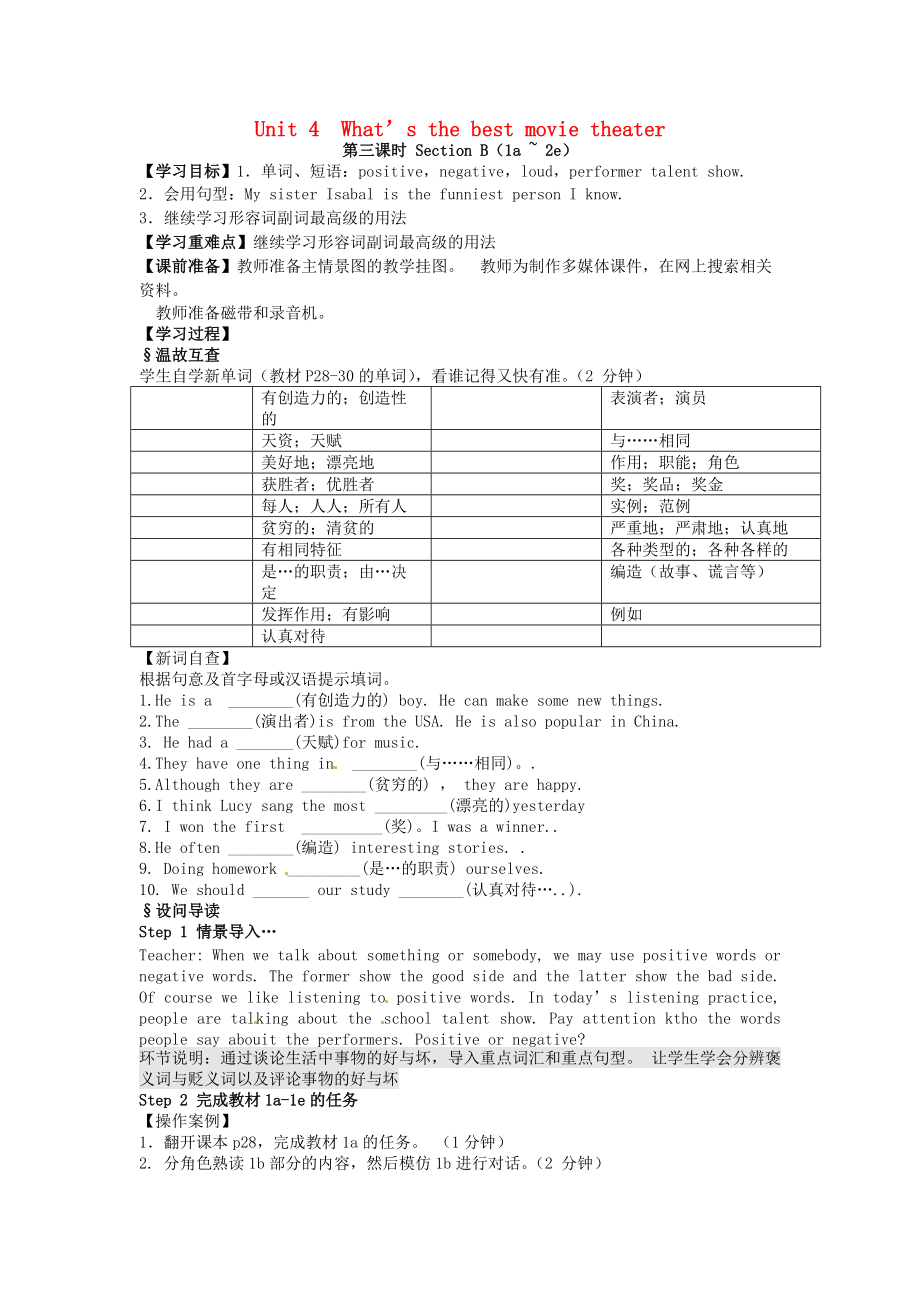《四川省瀘州市龍馬潭區(qū)八年級(jí)英語上冊(cè) Unit 4 What’s the best movie theater第3課時(shí)Section B1a2e學(xué)案無答案新版人教新目標(biāo)版》由會(huì)員分享�,可在線閱讀���,更多相關(guān)《四川省瀘州市龍馬潭區(qū)八年級(jí)英語上冊(cè) Unit 4 What’s the best movie theater第3課時(shí)Section B1a2e學(xué)案無答案新版人教新目標(biāo)版(3頁珍藏版)》請(qǐng)?jiān)谘b配圖網(wǎng)上搜索���。
1、
Unit 4 What’s the best movie theater
第三課時(shí) Section B(1a ~ 2e)
【學(xué)習(xí)目標(biāo)】1.單詞��、短語:positive����,negative����,loud,performer talent show.
2.會(huì)用句型:My sister Isabal is the funniest person I know.
3.繼續(xù)學(xué)習(xí)形容詞副詞最高級(jí)的用法
【學(xué)習(xí)重難點(diǎn)】繼續(xù)學(xué)習(xí)形容詞副詞最高級(jí)的用法
【課前準(zhǔn)備】教師準(zhǔn)備主情景圖的教學(xué)掛圖��。?教師為制作多媒體課件��,在網(wǎng)上搜索相關(guān)資料����。
?教師準(zhǔn)備磁帶和錄音機(jī)。
【學(xué)習(xí)過程】
溫故互查
學(xué)生
2��、自學(xué)新單詞(教材P28-30的單詞)����,看誰記得又快有準(zhǔn)。(2 分鐘)
有創(chuàng)造力的�;創(chuàng)造性的
表演者�;演員
天資�;天賦
與……相同
美好地;漂亮地
作用���;職能�;角色
獲勝者;優(yōu)勝者
獎(jiǎng)�����;獎(jiǎng)品�;獎(jiǎng)金
每人;人人�;所有人
實(shí)例;范例
貧窮的��;清貧的
嚴(yán)重地����;嚴(yán)肅地����;認(rèn)真地
有相同特征
各種類型的�;各種各樣的
是…的職責(zé)�;由…決定
編造(故事����、謊言等)
發(fā)揮作用;有影響
例如
認(rèn)真對(duì)待
【新詞自查】
根據(jù)句意及首字母或漢語提示填詞���。
1.He is a ________(有
3�����、創(chuàng)造力的) boy. He can make some new things.
2.The ________(演出者)is from the USA. He is also popular in China.
3. He had a _______(天賦)for music.
4.They have one thing in ________(與……相同)�。.
5.Although they are ________(貧窮的) �����, they are happy.
6.I think Lucy sang the most _________(漂亮的)yesterday
7. I
4、won the first __________(獎(jiǎng))�����。I was a winner..
8.He often ________(編造) interesting stories. .
9. Doing homework _________(是…的職責(zé)) ourselves.
10. We should _______ our study ________(認(rèn)真對(duì)待…..).
設(shè)問導(dǎo)讀
Step 1 情景導(dǎo)入…
Teacher: When we talk about something or somebody, we may use positive words or negat
5�、ive words. The former show the good side and the latter show the bad side. Of course we like listening to positive words. In today’s listening practice, people are talking about the school talent show. Pay attention ktho the words people say abouit the performers. Positive or negative?
環(huán)節(jié)說明:通過談?wù)撋钪?/p>
6���、事物的好與壞�,導(dǎo)入重點(diǎn)詞匯和重點(diǎn)句型。 讓學(xué)生學(xué)會(huì)分辨褒義詞與貶義詞以及評(píng)論事物的好與壞
Step 2 完成教材1a-1e的任務(wù)
【操作案例】
1.翻開課本p28�,完成教材1a的任務(wù)����。 (1分鐘)
2. 分角色熟讀1b部分的內(nèi)容����,然后模仿1b進(jìn)行對(duì)話�。(2 分鐘)
3. 聽第一遍錄音,完成1c的任務(wù)����。(3 分鐘)
4. 聽第二遍錄音���,完成課本上1d部分的任務(wù)����。并檢查核對(duì)答案�����。
5. 聽第三遍錄音����,并打開聽力材料����,全班逐句進(jìn)行跟讀��。
6. 完成課本上1e部分的任務(wù)��。
7. 模仿聽力內(nèi)容,利用1e的信息分角色練習(xí)對(duì)話�����。邀請(qǐng)2-3對(duì)學(xué)生當(dāng)堂演示�。
環(huán)節(jié)說明:將聽、說���、讀����、寫的任
7、務(wù)結(jié)合起來,不僅鍛煉了學(xué)生語言綜合運(yùn)用能力����,還鞏固了學(xué)生對(duì)語言目標(biāo)的學(xué)習(xí)記憶和運(yùn)用�。
Step3完成教材2a-2e的任務(wù)
1. 翻開課本P29, 快速閱讀2a部分的形容詞�����, 完成2a部分的任務(wù)�����,并邀請(qǐng)2-3組學(xué)生進(jìn)行展示��。
2. 快速默讀短文2b����,完成課本2b的任務(wù)�����,請(qǐng)幾位同學(xué)給出自己的答案���。
3. 完成課本2c部分的任務(wù)。再邀請(qǐng)幾位同學(xué)閱讀2c中的句子,然后讓學(xué)生帶著問題再去讀課文���。
4. 學(xué)生再一次閱讀短文�,完成教材2d的任務(wù)�。
5. 完成教材2e的任務(wù)����。并要求學(xué)生與自己的同伴進(jìn)行調(diào)查練習(xí)�����。
環(huán)節(jié)說明:通過小組合作學(xué)習(xí),提高學(xué)生的學(xué)習(xí)能力和合作意識(shí)�;通過對(duì)話練習(xí),不僅使學(xué)生鞏
8���、固了所學(xué)知識(shí)����,還提高了學(xué)生語言運(yùn)用的綜合能力。
自我檢測(cè)
根據(jù)2b完成短文
Everyone 1_________(擅長) something, but some people are 2________(true)relent. It’s always interesting 3_____(watch)the other people show their talents. Talent shows are getting 4________ (越來越)Talent. Now , there are similar shows 5_______(全世界)�����, 6____________
9�����、__(例如)China’s Got Talent���。
All these shows 7________________(有一個(gè)相同的特征)�����;they try to 8______(尋找)the best singers, the most talented dancers, the most exciting magicians, the funniest actors and so on. 9___________(與……不各種各樣的) people join these shows. But who can play the piano the best or sing the mo
10����、st10_______(beautiful) ? that’s 11______(取決于)you to decide. When people watch the show, they usually 12____________(扮演…角色)in 13____________(decide)the 14______(win). And the winner always gets a very good prize.
However, not everybody enjoys 15______(watch) these shows. Some think that the lives
11���、of the performers are 16_______(編造)��。 For example , some people say they are poor famers, but 17_______(事實(shí)上)they are just actors. However, if you don’t 18____(嚴(yán)肅的對(duì)待這些表演)���, they are fun to watch. And one great thing about them is that they 19_______(提供)people20_______(做…的方式) make their dreams 21______
12�����、__(實(shí)現(xiàn))
鞏固訓(xùn)練
)翻譯句子:
1. 本書跟那本書一樣有趣�����。This book is _____ _____ _____ that one.
2. 你游泳沒有你弟弟好�。You can’t swim _____ _____ _____ your brother.
3. 今天比昨天冷的多��。It is _____ ______ today______ it was yesterday.
4. 對(duì)這個(gè)故事我比另一個(gè)喜歡的多�。This story is _____ ______ ______ than that one.
5. 他比我大兩歲����。He is _____ ______ __
13���、____ than I.
6. 這個(gè)故事不如那個(gè)有趣。This story is _____ _____ _____ than that one.
7. 她的身體狀況一天天好起來���。He is getting _____ ______ ______ every day.
8.他對(duì)英語越來越感興趣���。He is becoming ______ _____ _______ _____ ______ English.
9.他吃的越多����,人越胖���。The more he eats, the _______ he gets.
10.你的問題是兩個(gè)中比較難的那個(gè)����。Your question is _______ ______ ______ of two.
拓展研究(詳見學(xué)生訓(xùn)練部分P.24)
課堂小結(jié)
作業(yè)
課后反思
我國經(jīng)濟(jì)發(fā)展進(jìn)入新常態(tài),需要轉(zhuǎn)變經(jīng)濟(jì)發(fā)展方式����,改變粗放式增長模式,不斷優(yōu)化經(jīng)濟(jì)結(jié)構(gòu)����,實(shí)現(xiàn)經(jīng)濟(jì)健康可持續(xù)發(fā)展進(jìn)區(qū)域協(xié)調(diào)發(fā)展��,推進(jìn)新型城鎮(zhèn)化�����,推動(dòng)城鄉(xiāng)發(fā)展一體化因:我國經(jīng)濟(jì)發(fā)展還面臨區(qū)域發(fā)展不平衡�、城鎮(zhèn)化水平不高����、城鄉(xiāng)發(fā)展不平衡不協(xié)調(diào)等現(xiàn)實(shí)挑戰(zhàn)。
 四川省瀘州市龍馬潭區(qū)八年級(jí)英語上冊(cè) Unit 4 What’s the best movie theater第3課時(shí)Section B1a2e學(xué)案無答案新版人教新目標(biāo)版
四川省瀘州市龍馬潭區(qū)八年級(jí)英語上冊(cè) Unit 4 What’s the best movie theater第3課時(shí)Section B1a2e學(xué)案無答案新版人教新目標(biāo)版

